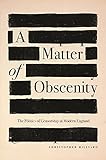A Matter of Obscenity : The Politics of Censorship in Modern England / Christopher Hilliard.
Material type: TextPublisher: Princeton, NJ : Princeton University Press, [2021]Copyright date: ©2021Description: 1 online resource (336 p.) : 1 tableContent type:
TextPublisher: Princeton, NJ : Princeton University Press, [2021]Copyright date: ©2021Description: 1 online resource (336 p.) : 1 tableContent type: - 9780691226118
- Censorship -- Great Britain
- HISTORY / Europe / Great Britain / Victorian Era (1837-1901)
- A. P. Herbert
- Amendment
- Arts council
- Attempt
- Barrister
- Blasphemous libel
- Blasphemy law
- C. R. Hewitt
- Cambridge University Press
- Censorship
- Chairman
- Chief constable
- Civil service
- Common law
- Confiscation
- Consideration
- Controversy
- Counsel
- Crime
- Customs
- D. H. Lawrence
- Decriminalization
- Defamation
- Defendant
- Deference
- Director of Public Prosecutions
- E. M. Forster
- England and Wales
- English law
- European Commission of Human Rights
- European Convention on Human Rights
- European Court of Human Rights
- Expert witness
- Fanny Hill
- Film censorship
- Freedom of speech
- Hank Janson
- Hicklin test
- Home Office
- Home Secretary
- Homosexuality
- Immorality
- Imprisonment
- Intention (criminal law)
- John Stuart Mill
- Jury
- Lady Chatterley's Lover
- Last Exit to Brooklyn
- Law enforcement
- Lawyer
- Lecture
- Legal Advisor (Office for the Administrative Review of the Detention of Enemy Combatants)
- Legislation
- Literacy
- Literary criticism
- Literary merit
- Literature
- Mary Whitehouse
- Mervyn Griffith-Jones
- Morality
- Nationwide Festival of Light
- Newspaper
- Novelist
- Obscene Publications Act 1959
- Obscene Publications Acts
- Obscenity
- On Liberty
- Pamphlet
- Paperback
- Penguin Books
- Police
- Politician
- Politics
- Pornographic film
- Pornographic magazine
- Pornography
- Post Office Act
- Precedent
- Private member's bill
- Private prosecution
- Prosecutor
- Prostitution
- Public morality
- Publication
- Publishing
- Recommendation (European Union)
- Roy Jenkins
- Sedition
- Shame
- Solicitor
- Statute
- T. S. Eliot
- Teach-in
- The Juror
- The Well of Loneliness
- Underground press
- V
- Victorian era
- Wolfenden report
- Writing
- 363.31094209/03 23
- online - DeGruyter
| Item type | Current library | Call number | URL | Status | Notes | Barcode | |
|---|---|---|---|---|---|---|---|
 eBook
eBook
|
Biblioteca "Angelicum" Pont. Univ. S.Tommaso d'Aquino Nuvola online | online - DeGruyter (Browse shelf(Opens below)) | Online access | Not for loan (Accesso limitato) | Accesso per gli utenti autorizzati / Access for authorized users | (dgr)9780691226118 |
Browsing Biblioteca "Angelicum" Pont. Univ. S.Tommaso d'Aquino shelves, Shelving location: Nuvola online Close shelf browser (Hides shelf browser)

|

|

|

|

|

|

|
||
| online - DeGruyter German Romanticism and Its Institutions / | online - DeGruyter Bollingen Series (General). Twelve Caesars : Images of Power from the Ancient World to the Modern / | online - DeGruyter Ways of Hearing : Reflections on Music in 26 Pieces / | online - DeGruyter A Matter of Obscenity : The Politics of Censorship in Modern England / | online - DeGruyter Hannah Arendt and Isaiah Berlin : Freedom, Politics and Humanity / | online - DeGruyter Dark Matters : Pessimism and the Problem of Suffering / | online - DeGruyter Embattled Europe : A Progressive Alternative / |
Frontmatter -- Contents -- Introduction -- Chapter 1 Obscenity, Literacy, and the Franchise, 1857–1918 -- Chapter 2 The Censorship versus the Moderns, 1918–1945 -- Chapter 3 Protecting Literature, Suppressing Pulp, 1945–1959 -- Chapter 4 The Lady Chatterley’s Lover Trial, 1960 -- Chapter 5 The Liberal Hour, 1961–1969 -- Chapter 6 Subversion from Underground, 1970–1971 -- Chapter 7 Campaigners and Litigants, 1972–1977 -- Chapter 8 Philosophers and Pluralists, 1977–1979 -- Conclusion -- Acknowledgments -- Abbreviations -- Notes -- Manuscript Sources -- Index -- A note on the type
restricted access online access with authorization star
http://purl.org/coar/access_right/c_16ec
A comprehensive history of censorship in modern BritainFor Victorian lawmakers and judges, the question of whether a book should be allowed to circulate freely depended on whether it was sold to readers whose mental and moral capacities were in doubt, by which they meant the increasingly literate and enfranchised working classes. The law stayed this way even as society evolved. In 1960, the prosecutor asked the jury in the obscenity trial over D. H. Lawrence's Lady Chatterley's Lover, "Is it a book that you would even wish your wife or your servants to read?" Christopher Hilliard traces the history of British censorship from the Victorians to Margaret Thatcher, exposing the tensions between obscenity law and a changing British society.Hilliard goes behind the scenes of major obscenity trials and uncovers the routines of everyday censorship, shedding new light on the British reception of literary modernism and popular entertainments such as the cinema and American-style pulp fiction and comic books. He reveals the thinking of lawyers and the police, authors and publishers, and politicians and ordinary citizens as they wrestled with questions of freedom and morality. He describes how supporters and opponents of censorship alike tried to remake the law as they reckoned with changes in sexuality and culture that began in the 1960s.Based on extensive archival research, this incisive and multifaceted book reveals how the issue of censorship challenged British society to confront issues ranging from mass literacy and democratization to feminism, gay rights, and multiculturalism.
Mode of access: Internet via World Wide Web.
In English.
Description based on online resource; title from PDF title page (publisher's Web site, viewed 01. Dez 2022)


